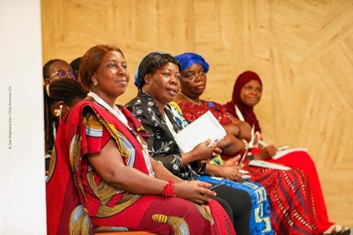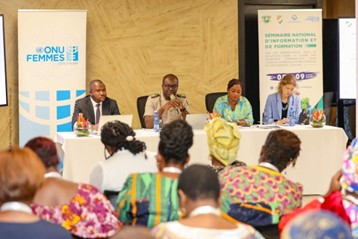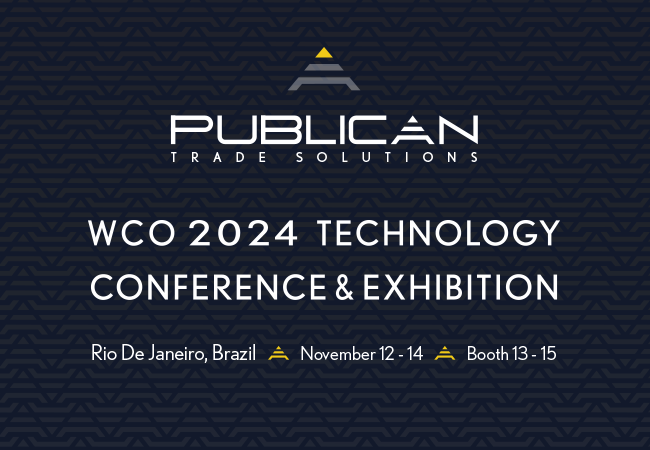Engaging with partners to advance Gender Equality and Diversity in Customs
31 October 2024
By Johanna Törnström, Project Manager and Gender Equality and Diversity Expert, Capacity Building Directorate, WCO SecretariatIn line with the WCO theme for 2024, “Customs Engaging Traditional and New Partners with Purpose”, the WCO Secretariat is increasing its efforts to leverage collaboration with new and existing partners to advance Gender Equality and Diversity (GED) in Customs.
Adopting a peer-to-peer approach to capacity building to enable mutual learning
In 2022, to respond to increasing demand from WCO Members for support in the area of GED, the Secretariat started working on the development of a pool of ‘Recognized experts’. An expert profile was developed to establish the required qualifications and skills, followed by a call to Members to submit candidates. Two ‘train-the-trainer’ workshops were later organized, one for selected English-speaking candidates in March 2023, and one for French-speaking candidates in April 2024. To complete their recognition process and obtain “Recognized expert” status, candidates must successfully deliver capacity-building activities led by the WCO Secretariat. So far, six experts have obtained full “Recognized expert” status.
One of the main benefits of this peer-to-peer approach to capacity building is that experts and participants both learn from the process. Goitseone Lenyatso, a Senior Customs Expert from the Botswana Unified Revenue Services (BURS) who supported a GED capacity-building mission in Ghana in March 2024, explained that she took a lot of ideas back home. “The National Trade Facilitation Committee (NTFC) in Ghana has a Trade and Gender Sub Committee and this is something we could also set up in Botswana”, she explained. “Another high point for me was the conversations we had with small-scale traders. They shared their experiences and expressed their needs. It clearly demonstrates that engaging with stakeholders in an inclusive way is key to enhancing trade facilitation and compliance”, she added.
Jonathan Bouchard, Chief of Operations from the Canada Border Services Agency (CBSA) who co-delivered two workshops in Côte d’Ivoire and Nigeria, also describes his support to WCO capacity-building activities as extremely rewarding. “Not only have I met amazing experts from the WCO, but I have learned from the administrations we are supporting and brought innovative ideas back to my administration”, he declared.
Partnering with the West Africa Security Project to update the Gender Equality Organizational Assessment Tool (GEOAT)
An updated version of the GEOAT was published in December 2023 thanks to the contribution of WCO Members and funding provided by the West Africa Security Project (WASP), which is implemented by the WCO Secretariat and funded by the German Federal Foreign Office.
The GEOAT now includes a template to facilitate its use and self-assess existing policies and procedures on gender equality and diversity in order to identify areas where improvement may be needed.
A chapter on Security and Safety has also been added. This chapter includes indicators such as:
- building risk profiles leveraging sex-disaggregated data,
- collaborating with other border agencies to address issues such as migration and human trafficking,
- fostering harmonization of GED considerations related to security and safety policies, and procedures applying a gender and diversity perspective, to increase awareness of various risks that different groups are exposed to,
- consulting with travellers and traders crossing the border, as well as with local communities, on security concerns to ensure that these concerns are addressed,
- providing appropriate infrastructure at the border, taking into account the specific needs of different groups including women, children and persons with disabilities,
- striving to ensure a gender balance among staff holding enforcement, investigation and security-related positions at border posts and on security-related committees.
Partnering with other WCO donor-funded programmes to make GED tools known
The WCO recommends implementing gender equality and diversity on a cross-cutting level, in internal policies (human resource management), external policies (border operations and engagement with stakeholders), and in overall coordination, monitoring, and evaluation mechanisms.
Several donor-funded capacity-building programmes led by the WCO Secretariat[1] had expressed an interest among their partner administrations to better understand how to use the GEOAT. With the support of these programmes, virtual introductory sessions on the GEOAT and its use were held on 5 and 6 June 2024 with representatives of 27 Customs administrations. Participants learned how to use the GEOAT in order to carry out a diagnostic and develop a dedicated GED action plan.
Moreover, under the framework of the WASP, two sub-regional workshops were organized in Nigeria in April 2024 and in Côte d’Ivoire in July 2024 using an upgraded version of the WCO’s one-week training material on “Advancing Gender Equality and Diversity in Customs”. Thanks to the support from two additional capacity-building programmes, namely the Accelerate Trade Facilitation Programme and the Anti-Corruption and Integrity Promotion (A-CIP) Programme, additional countries were able to join these sub-regional workshops.
Supporting Customs administrations in engaging with stakeholders
 The WCO Secretariat has also organized, in collaboration with Customs administrations, two national stakeholder engagement seminars targeting small and medium-sized enterprises (SMEs), and in particular women traders. The first one took place in Accra, Ghana, in March 2024 and the second in Abidjan, Côte d’Ivoire, in July 2024.
The WCO Secretariat has also organized, in collaboration with Customs administrations, two national stakeholder engagement seminars targeting small and medium-sized enterprises (SMEs), and in particular women traders. The first one took place in Accra, Ghana, in March 2024 and the second in Abidjan, Côte d’Ivoire, in July 2024.
These activities were also conducted under the framework of the WASP component on Gender Equality and Diversity, which recognizes that developing and implementing gender responsive and inclusive policies is a prerequisite for achieving sustainable development and for ensuring peace and security.
Studies have shown that SMEs involved in cross-border trade, and especially those run by women, are faced with specific challenges that are often neglected by Customs. For instance, they often lack knowledge on Customs policies and procedures, as well as on their rights and obligations. They are also more frequently exposed to risks such as corruption and harassment. Moreover, often they do not trust government officials and are fearful of Customs officers.
The seminars aimed at building a mutual understanding and improving relationships between the two sides. Customs officers explained policies and procedures related to import/export, with particular focus on the opportunities generated by the African Continental Free Trade Agreement (AfCFTA) and the World Trade Organization (WTO) Trade Facilitation Agreement (TFA). Participants were also briefed on the role of Customs in collecting revenue, facilitating trade, ensuring safety, and protecting society, the challenges Customs face and the importance of compliance.
As for the small and medium traders, they provided information on their experience and the issues they faced with current regulations and procedures, and were able to put questions to the Customs representatives. These exchanges revealed a lack of knowledge not only of how to properly declare goods, but also of how to submit complaints to Customs. Another aspect that was raised was the dependency of these traders on forwarding agents, which in some cases would worsen the situation by creating or increasing confusion and misunderstanding.
Some of the participants in the seminar held in Ghana belonged to the Organization of Women in International Trade (OWIT). One of them expressed her satisfaction, saying that “the seminar enabled us to better understand Customs processes at ports and the importance of submitting proper declarations. We now understand the rationale behind some of the things which impact our business adversely, especially heavy import duties on goods, and that Customs officers have to collect them on all transactions.”
 Other key topics raised for discussion were safety and security. The importance of having an appropriate infrastructure which also took into account the needs of women and other groups, such as persons with disability, was addressed. Recommendations included providing separate sanitary facilities, inspection rooms and appropriate lighting at night, as well as safe detention spaces that were sex and age appropriate. Participants also discussed issues such as harassment and gender-based violence, and pointed out that having female Customs officers at the borders was useful, not only to conduct body searches on women but also to ensure fairness in the way regulations were enforced.
Other key topics raised for discussion were safety and security. The importance of having an appropriate infrastructure which also took into account the needs of women and other groups, such as persons with disability, was addressed. Recommendations included providing separate sanitary facilities, inspection rooms and appropriate lighting at night, as well as safe detention spaces that were sex and age appropriate. Participants also discussed issues such as harassment and gender-based violence, and pointed out that having female Customs officers at the borders was useful, not only to conduct body searches on women but also to ensure fairness in the way regulations were enforced.
The stakeholder engagement seminars resulted in the drafting of recommendations that will help the Ghana Revenue Authority and Côte d’Ivoire Customs enhance their collaboration with these trader groups, ultimately making the trade environment more inclusive. One of the forward recommendations identified was to hold such events on a more regular basis and make them an embedded part of the administration’s stakeholders engagement policy.
Engaging with organizations involved in GED at the national and international levels
Organizing these various events provided an opportunity for the WCO Secretariat to leverage new partnerships. The seminar organized in Ghana benefited from the collaboration of the Trade and Gender Sub Committee of Ghana’s National Trade Facilitation Committee (NTFC), and the one organized in Côte d’Ivoire from the collaboration of the United Nation’s (UN) Women’s Office in Abidjan, who mobilized their contacts with ministries and women trader associations.
Collaborating with these organizations was extremely valuable not only in ensuring that the right target groups were invited to the seminars, but also in initiating partnerships between Customs and key national actors that would pave the way to other initiatives advancing the GED agenda in Customs. The WCO strongly advocates for more collaboration on the topic of GED, be it with other government agencies, national or international stakeholders, as this can help Customs to enhance their efforts in promoting GED.
The WCO Secretariat is also increasing its efforts to develop relationships with other international development partners working in the area of GED and trade. The number of partners with whom the Secretariat is in regular contact on the topic of GED has significantly increased in recent years, and synergies and collaboration opportunities are being examined with several of them, including the Asia-Pacific Economic Cooperation (APEC), Expertise France, the German Agency for International Cooperation (GIZ), the International Trade Centre (ITC), INTERPOL, the Organization for Security and Co-operation in Europe (OSCE), UNCTAD, the United Nations Development Programme (UNDP), UN Women, the World Bank Group (WBG) and the World Trade Organization (WTO).
More information
WCO GED activities and tools
[1] These programmes are the Accelerate Trade Facilitation Progamme, the Anti-Corruption and Integrity Promotion (A-CIP) Programme, the SECO-WCO Global Trade Facilitation Programme (GTFP), the SIDA-WCO Trade Facilitation and Customs Modernization Programme, and the West Africa Security Programme (WASP).

